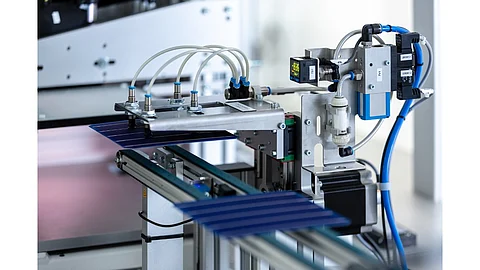

Germany’s solar research institutes have collaborated with VDMA and RCT Solutions to propose measures to strengthen the country’s solar PV industry
They want the new German government to consider these proposals to make use of the German know-how about solar technology at a global level
Part of the suggested measures include going back to the 2019/2020 level of research funding for the industry
Solar PV industry stakeholders and research institutions in Germany have come up with a position paper to recommend 3 key measures for the country’s new government that they believe will sustainably strengthen the European solar PV industry. Their demands include assuring a minimum €100 million/year research and development (R&D) funding.
The PV PILOT Project has been put together by the local industrial association VDMA, RCT Solutions and leading German solar research institutions namely Fraunhofer Institute for Solar Energy Systems (Fraunhofer ISE), Institute for Solar Energy Research (ISFH), Helmholtz Center Berlin (HZB), and ISC Konstanz.
“With the PV PILOT project, we are working together with the ISC, the ISFH and the HZB, RCT Solutions and the VDMA department "Photovoltaic Production Equipment" on a strategy for how the solar industry in Germany can be sustainably strengthened through research and development, pilot technology and turnkey concepts,” says Fraunhofer ISE Director Prof. Dr. Andreas Bett.
The 3 key measures put forth by the partners are:
Expansion of the production of innovative high-tech products in Germany/Europe by expanding existing manufacturing facilities and creating new capacities. For this, they seek investment and strategic support of European programs such as the Net Zero Industry Act (NZIA) and the Temporary Crisis and Transition Framework (TCTF).
Internationally exploit and promote mechanical engineering with technological know-how by strengthening the German industry to compete internationally. This includes international cooperation to develop technical solutions on an ‘equal footing’ to help shape the global standard. Part of the plans suggested include building production infrastructure using European resources to reduce dependence on non-European actors such as China, while advocating ‘balanced’ cooperation with the Chinese companies. They also want to have practical testing platforms to develop and promote complete European/German solutions internationally.
Expansion of R&D infrastructure for innovation with research funding returned to the 2019/2020 level, which was at least €100 million/year, to benefit research institutes, mechanical engineering and other key players for the region to regain leading technological positions in this space. The focus of future R&D efforts will be on further development of crystalline silicon, perovskite and other thin-film technologies, along with tandem cells.
“With this initiative, we are supporting both German solar research and industry - especially mechanical engineering, which forms the backbone of German PV value creation,” stressed the Head of the Photovoltaic Production Equipment Department at VDMA, Dr. Puzant Baliozian.
They plan to send the proposal to Bundestag parties to influence coalition talks and strengthen Germany's solar industry. Germany’s 2025 federal elections have accorded majority to the CDU/CSU alliance while relegating the Greens Party to the backseat (see German Federal Elections 2025 Give Power To Conservative Coalition).
This position paper followed the recent launch of the International Solar Manufacturing Initiative (ISMI) led by SolarPower Europe (SPE), which aims to help create global demand for European solar PV products (see SolarPower Europe Launches International Solar Manufacturing Initiative).
Some of the partners of the PV PILOT Project, namely RCT Solutions, Fraunhofer ISE, ISC Konstanz and VDMA, will be present at the TaiyangNews Solar Technology Conference India 2025 which will be held in-person on April 10 and 11, 2025 in New Delhi. Registrations for the event can be done here.
